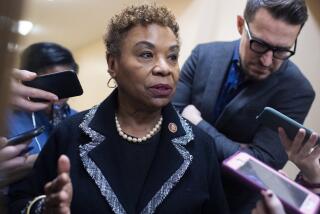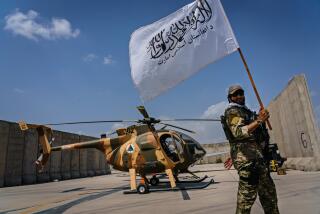Push for Afghanistan troop increase continues on deadly day
- Share via
KABUL, AFGHANISTAN, AND WASHINGTON — On a day when 14 U.S. servicemen and drug agents were killed in helicopter crashes in Afghanistan, the largest such toll in more than four years, momentum continued to build to send more troops to the war zone.
Sen. John F. Kerry (D-Mass.), chairman of the Senate Foreign Relations Committee, said in a Washington address that he would support a decision by President Obama to “send some additional troops” provided improvements are made in Afghan troop training and government, and civilian aid efforts are increased.
Obama, speaking to service members in Jacksonville, Fla., promised his full support for all troops he sends into battle, as he continues to review his Afghanistan strategy.
“I will never rush the solemn decision of sending you into harm’s way. I won’t risk your lives unless it is absolutely necessary,” Obama said. “And if it is necessary, we will back you up to the hilt.”
The president acknowledged the deaths of 14 Americans in a pair of helicopter crashes in Afghanistan, the largest single-day loss of life for U.S. forces since June 2005, when 16 American troops died after their helicopter was shot down by insurgents.
Two U.S. Marine helicopters collided in midair Monday in Helmand province in Afghanistan’s south, where a major U.S. offensive has been underway for four months. Four Marines were killed and two others injured, the military said. Hostile fire was ruled out, and the cause of the collision remained under investigation.
Seven more U.S. troops and three Drug Enforcement Administration agents died when a Chinook transport helicopter crashed before dawn after a firefight in the west of the country, NATO and American officials said. Those aboard had been searching for drug traffickers. Twenty-six people were injured in the crash -- 14 Afghan troops, 11 American troops and a U.S. civilian.
The cause of the crash was not immediately determined, military officials said, but the clash that preceded it left about a dozen militants dead. The Taliban claimed to have shot down a Western military helicopter Monday in Afghanistan’s northwest, but it was not clear whether it was the same incident.
This has been the deadliest year for American forces since the 2001 invasion, with 267 U.S. troops killed so far, according to icasualties.org. The total for last year, the second deadliest for the Americans, was 155.
Obama, speaking at the Naval Air Station in Jacksonville, told sailors and aviators: “They were willing to risk their lives, in this case, to prevent Afghanistan from once again becoming a safe haven for Al Qaeda and its extremist allies.”
His speech came after a morning meeting with his war council as the broad outlines of an administration policy began taking shape.
The administration is moving toward adoption of a broad counterinsurgency strategy, as officials increasingly reject calls for a more limited approach of military strikes against Al Qaeda.
White House officials announced no decisions Monday, but signs have pointed to a likely troop increase.
The conditional backing by Kerry, one of the first Democrats to express reservations about a major troop buildup, came amid new impetus for an expanded counter-terrorism strategy, including an endorsement last week by America’s North Atlantic Treaty Organization allies. The decision last week to hold a runoff in Afghanistan’s presidential race, adding legitimacy to the next government in Kabul, also has boosted prospects for an approach requiring more troops.
Kerry’s remarks signaled that he generally agrees the war should be fought as a counterinsurgency, in which foreign allies help protect the Afghan population while working to improve the government and economy.
But Kerry also said that a request by Army Gen. Stanley A. McChrystal, the top U.S. and allied commander in Afghanistan, for 40,000 troops “reaches too far, too fast.” Kerry suggested that he supports sending more troops, but perhaps fewer than the 40,000 requested by McChrystal.
“He’s supportive of counterinsurgency strategy but . . . a conditioned expansion,” said a congressional staffer.
Kerry’s comments, at the Council on Foreign Relations in Washington, represent a shift for the senator, who has worked closely with the Obama administration on Afghanistan. Earlier this year, he expressed doubts about the war, comparing it to the war in Vietnam.
On Monday, he contrasted the two conflicts and rejected proposals to reduce U.S. troop levels. He suggested any differences with the Obama administration could be bridged.
“Under the right circumstances, if we can be confident that military efforts can be sustained and built on, then I would support the president, should he decide to send some additional troops to regain the initiative,” he said.
Kerry worked closely with senior administration officials this month to persuade Afghan President Hamid Karzai to agree to a runoff in the presidential election, overcoming Karzai’s unhappiness that he had been denied a victory in the Aug. 20 balloting.
Obama on Monday reiterated that his chief goal is to prevent Al Qaeda from returning to onetime safe havens in Afghanistan.
Military officials say that objective would require an energetic counterinsurgency campaign, aimed not just at killing terrorists but also at helping the Afghan government prevent a return to power by the Taliban.
It is still unclear what specific approach Obama is likely to endorse. The White House has not committed to McChrystal’s troop request, or to his specific plan for countering the Taliban while protecting the Afghan people, said officials familiar with the discussions who spoke about them on condition of anonymity.
The White House is considering other proposals that would send fewer troops, prioritize key population centers or emphasize training. But, the officials said, the alternative plans are fundamentally still counterinsurgency campaigns.
Although the White House appears to have settled on its top goals, officials still must decide how best to accomplish them. Meanwhile, a strategy review that was supposed to last a few weeks now appears likely to stretch into a third month, drawing criticism from Republicans.
“Unfortunately, the lack of decisiveness about how to best proceed is emboldening our enemies and endangering our troops and our friends,” said Rep. Cynthia Lummis (R-Wyo.).
But Obama defended the review and told sailors the military deserved a “clear mission” and clearly defined goals.
--
julian.barnes@latimes.com
paul.richter@latimes.com
Times staff writers Christi Parsons in Jacksonville, Fla., and Richard Simon in Washington contributed to this report.
More to Read
Sign up for Essential California
The most important California stories and recommendations in your inbox every morning.
You may occasionally receive promotional content from the Los Angeles Times.











